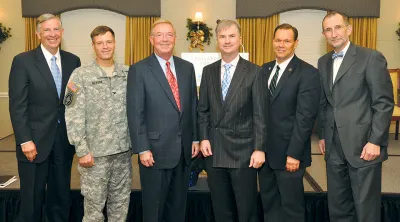Helping veterans transition to healthcare careers

Special forces medical sergeants in the U.S. Army are considered to be the finest first-response/trauma medical technicians in the world. Trained with a primary emphasis on trauma medicine, they also have a working knowledge of everything from dentistry to optometry and even veterinary care. And 92 percent of these valuable, highly trained soldiers report that they one day want to pursue a career in healthcare outside of a military setting.
Blue Cross and Blue Shield of North Carolina (BCBSNC), which serves a state with the third largest military population in the U.S., set out to help them do that. BCBSNC and the University of North Carolina (UNC) School of Medicine are collaborating to create a physician assistant master’s degree program at the University of North Carolina, specifically for these returning military veterans.
Blue Cross Blue Shield companies across the U.S. share a commitment to improving the health and wellness of the communities we call home by identifying local issues and using the Power of Blue to work toward a solution. The physician assistant master’s degree program addresses two critical local issues in North Carolina: assisting military veterans in their transition to a new career after their service, and training more skilled medical professionals in a state where nearly 1 million people live in areas with a shortage of healthcare professionals.
The UNC program was developed with input from the U.S. Army Special Operations Command team at Fort Bragg, N.C., to build on the medical training and experience that special forces medical sergeants receive during their service and provide opportunities for veterans who want to transfer their skills to the healthcare system.
UNC will create a two-year curriculum with training rotations at UNC Hospitals and free clinics around the state. The program’s training will focus on primary care to meet the needs of underserved communities in North Carolina, and hopes to encourage the veterans to continue their medical careers in North Carolina, where many have already established families and community ties.
BCBSNC has pledged to fund the program for four years to help UNC establish the master’s curriculum and hire full-time program staff. A significant portion of the BCBSNC funding will provide scholarship funds for veterans through the Medical Foundation of North Carolina.
The program expects to enroll its first class of student veterans in 2015.
To learn more about this and other Blue Cross Blue Shield community investments, download the full Investing in America’s Health report.
